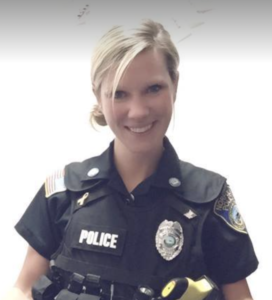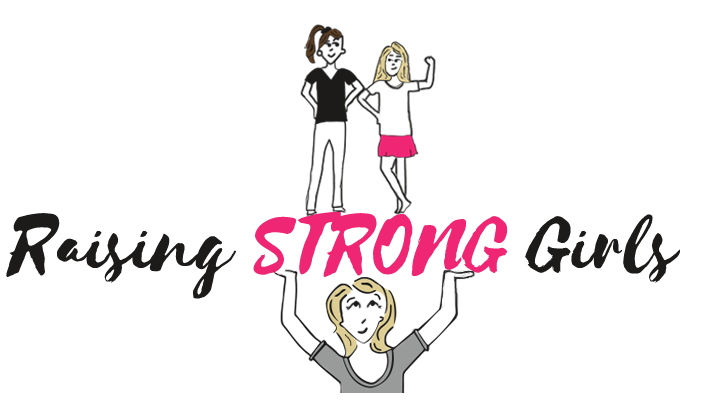
Thank you for taking the time to read RSG’s latest post. Below are embedded links to products we, or our experts, recommend to you. If you click and purchase anything from these links a small stipend will be sent to RSG. Thank you for supporting our page and our message of Raising STRONG Girls.
This seems like a particularly fitting post for today since it falls on International Women’s Day. I recently attended a seminar hosted by one of our local school resource officers, Michelle Palladini. A friend of mine had been forwarding me her seminar topics for quite some time, but I was always booked. Wish I had known what I was missing! She is an amazingly inspirational STRONG woman who works with kids in the community to build their strengths. Can’t wait to share some of her expertise with all of you!
Resident Expert:
Michelle Palladini, an award-winning detective in Norfolk County, Massachusetts, is also a school resource officer at King Phillip Middle School. She is a certified teacher, mother, inspirational speaker, children’s yoga/mindfulness instructor, community advocate and blogger.
Expertise:
Michelle taps her diverse skillset to lead a variety of community programs incorporating youth/police relationships, police leadership, education, mindfulness, work/life balance, and parenting seminars. She is widely respected for her policing expertise and commitment to the care and protection of children.
A strong proponent of community policing and “building villages” to instill, nurture and foster a strong, fundamental support for children, her zeal for bettering the lives of others has taken on a life of its own. In 2013, Michelle was inspired to develop the L.E.A.P. (Leadership, Empowerment, Awareness, Protection) Program, offering a solution-focused method for connecting police with schools and parents as a pathway to children’s success in four areas: happiness, health, safety and resilience.
Officer Palladini is highly involved in community and family relations in many different aspects, making it hard for us to pick just one theme to talk about. So, we asked her to share the most important topics for our Raising STRONG Girls’ readers to help us understand and connect better with our teens.
-
Communication
We want our kids to come to us with anything and everything. Unfortunately, we make it hard for them because we are judgmental, authority figures in their world (even when we try not to be).
Our kids need to have adults in their lives they can trust completely and turn to when they have an issue in their lives they need help with. It could be an aunt, an older cousin, a family friend or neighbor, a friend’s parents.
Parenting Tip:
That advocate needs to be able to listen intently and completely and provide sound advice that isn’t biased. Parents and their children should brainstorm together about who that adult might be. Does he/she have a natural relationship with someone that makes this an easy fit or do you need to think out of the box?
If your child is open to it, I also think all kids could benefit from a therapist or life coach. Kids really want to sit and talk and have an adult care enough to invest the time to listen and respond.
-
Mental Health
Mental health is at forefront of everything with kids. I’m not talking about mental health issues that require a clinical diagnosis, but everyday activities or practices (such as mindfulness) we can encourage our children to participate in to make them feel more confident in their world. In my work in the school system, I’ve found that most kids are struggling with some type of anxiety. For the most part parents don’t know what to do or how to manage it.
This is particularly difficult because we, as parents, are trying to give our kids the best advice we can. We may not realize that sometimes advice isn’t what they are looking for or need. Often, they just need someone to listen. Or, they just want to vent. And, above all, they need coping mechanisms.
Our schools don’t have the time to provide the resources our teens need to help them manage stress and/or provide real-world life advice they need to balance everything that is coming at them during adolescence.
Parenting Tip:
I’m teaching my daughter mindfulness. Mindfulness helps us to pay attention to the here and now, without judgement, approaching all situations with kindness and curiosity. I also lead mindfulness practices with kids in the middle school. The students go through guided meditation and a relaxation process. It’s amazing the results I see when they are finished. They sit up and everyone looks more at ease. We are teaching them about the natural high you can get from quieting the mind for a few minutes each day.
The key is to try and get our kids to focus on the present moment and not worry about what is coming up next. There are many science and research programs that say that practicing mindfulness helps to develop neural pathways that help kids access the part of the brain that allows them to make better choices. Daniel Siegel’s books, “Brainstorm: The Power and Purpose of the Teenage Brain.” and “The Whole-Brain Child” are great resources for parents.
I’ve also found a great way to introduce meditation to teens with an app called Insight Timer. It combines their love of technology with valuable online resources to calm their minds. This app provides guided meditations for various states of mind. Topics like “One Minute Meditation” or “Five Minutes of Self Compassion” or “Present Moment Awareness with the Breath” are some examples of the guided topics it offers. It’s like having a personal therapist right on their iPhone!
-
Social media
This sounds counter intuitive to what I just said about using technology to help our kids. Technology is fine, if it is monitored and limited in scope, but there are sooo many possible concerns:
The first is HEALTH. There are so many things we don’t know about the effects of long-term technology use. Chronic cell phone use is relatively new, so we don’t know the impact it might have on their brains as they age. We are all addicted to our devices – parents and kids alike.
BULLYING is another. Social media has become THE venue for bullying. It provides an anonymous platform for kids to hide behind when they want to torment other kids. We’ve seen the detrimental effects in the news of these actions.
DISTORTION of the Real World. Information teens obtain via technology is a constant comparison of how they don’t measure up to others. Teens are using apps that manipulate the way they look before posting pictures so that every imperfection can be corrected in real time. In short, kids are learning it is not okay to be your authentic self.
Essential Mom Advice:
Praise your child for their effort, not the result. As someone who is a recovering perfectionist, I can tell you that being told I was “smart” my whole life was extremely detrimental to my well-being. In middle school, the work got harder, and I felt “stupid.” Had the adults in my life praised the effort, not the grade, I would have been far better off. For example, “You studied so hard for that test!” instead of “Good job getting an A!” If we promote growth mindset, our children will see their failures as opportunities for learning, and are far more resilient for it.
We need to get out of the mindset of saying things like: “That’s good!” “Nice picture!” “Great job!” Our children greatly benefit from detailed, heart-felt responses. For example, my seven- year-old often brings home pictures she’s drawn in school. Instead of saying, “Wow, great picture!” I will say, “I love the colors you used for the panda and the way you made the grass look textured.”


It’s so important for all parents to remember the stresses that kids are under today — many that we didn’t have to face.
Such good advice and so full of common sense… I especially like the idea sea of praising the effort and not the end result !thanks